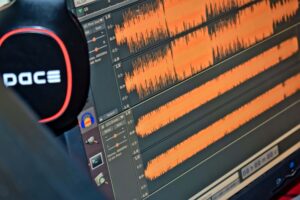You’re thinking about purchasing the new Mac Mini M1, aren’t you? Perhaps you’ve already got the 2018-2020 Mac Mini or maybe it’ll be your first… Either way, you’re probably wondering if the more affordable Mac Mini M1 can outperform the entry-level Intel Mac Mini. The truth is both of these computers are great for music production, but which one is better?
The new 2020 Mac Mini M1 outperforms the 2020 Mac Mini i3. Does that surprise you? We’ll be looking at some benchmarks to better illustrate the key differences, but there are still some pretty significant issues to address with the Apple M1 chip. That’s what we’ll be discussing for the rest of this article. If you’re thinking of upgrading your current Mac Mini or simply in the market to try the new Apple Silicon, then you’ll want to read this article to the VERY END. Are you ready? Let’s get started!
- Mac Mini M1 vs Mac Mini i3 – Logic Pro X CPU Benchmarks
- Apple M1 support for music producers
- M1 Mac Mini vs Intel Mac Mini – Comparing Features
- Is the 2020 Mac Mini M1 ready for music production?
Mac Mini M1 vs Mac Mini i3 – Logic Pro X CPU Benchmarks
The first thing we’ll be considering is how the new Mac Mini M1 performs compared to the Mac Mini i3. Since we’re focusing on music production though, we’ll be using one of my favourite Logic Pro X benchmarks which can be found here.
NORMALLY, we could use any DAW for the test…
The problem is that Logic Pro X is the only DAW optimized for the M1 chip.
We’ll be talking more about this in the next section but for now, let’s just agree that using Logic Pro X as our benchmark is the only way to get accurate results.
So, let’s look at some results!
2018-2020 Apple Mac Mini (Intel i3-8100)
- # of software instruments = 34
- # of voices = 136
- # of plugins = 170
2020 Apple Mac Mini (Apple M1)
- # of software instruments = 111
- # of voices = 444
- # of voices = 555
Those are some pretty significant improvements… Don’t you think?
I encourage you to consult the website for yourself if you want to run youvr own tests and/or compare with other Apple computers. However, you’ll notice that the Mac Mini i3 isn’t included on the list. You’ll also notice that the Mac Mini M1 results are slightly different.
The Mac Mini i3 that was used is my own.
The results for the Mac Mini M1 are actually from this video.
It’s very clear to me that the M1 chip outperforms most of the Intel processors on that list. I’m honestly impressed and astounded that Apple has actually made their M1-based machines MORE affordable than the Intel alternative.
However, we still haven’t considered the issues M1-users currently face…
Apple M1 support for music producers
The biggest issue with the Apple M1 (at the time of writing) is its lack of support from 3rd party manufacturers/developers. That’s why we ABSOLUTELY needed to use Logic Pro X to run the benchmark otherwise, the results would’ve been WAY different.
Does that mean that the Apple M1 isn’t suitable for music production?
That’s not necessarily the case since the un-optimized software will still work BUT, it’ll be emulated (which will slightly decrease performance). In other words, you won’t gain anything and it’ll require more resources to run those 3rd party applications.
However, it’s only a matter of time before manufacturers/developers begin working on that.
I’m simply saying that for the time being, the upgrade may do you more harm than good.
That’s especially true because of MacOS Big Sur which is basically the same situation as MacOS Catalina EXCEPT you’ll be required to have it. It’s the only OS that can run on these new Apple M1 chips.
I still use MacOS Mojave since I’d rather play it safe in terms of compatibility.
If you’re still using any 32-bit applications, you won’t be able to run them on Catalina/Big Sur.
The ONLY reason I’d recommend purchasing the Mac Mini M1 right now is if you were simply looking for your first computer for music production. That’s because you most likely won’t have developed your “toolbelt” of software/plugins yet.
Professional music producers CANNOT work without their tools, so I won’t be making the move until I’m certain that everything will be compatible/optimized.
I’m also waiting to see if Apple offers any higher-end models in the future (I’m sure they will).
M1 Mac Mini vs Intel Mac Mini – Comparing Features
Although it may seem like nothing has changed, you’ll just need to take a closer look. One of my favourite features of the 2018-2020 Mac Mini was the additional Thunderbolt 3 ports.
Most Apple computers feature a maximum of TWO Thunderbolt ports.
However, the 2018-2020 Mac Mini was the first to feature FOUR of them.
It’s not that big of an issue though, even for someone who uses lots of Thunderbolt ports. That’s because you could always purchase an additional Thunderbolt dock to daisy-chain your collection of Thunderbolt-compliant devices.
Here’s the one I personally recommend!
The real deal-breaker for me was the inability to use an external GPU.
In the past, it was possible to purchase an external GPU enclosure like this one and to connect it via one of the Thunderbolt 3 ports for enhanced graphical performance.
It’s necessary for serious video editing and/or gaming, but not music production. I get it…
It’s also worth noting that the integrated M1 GPU is much better than any of the Intel-based integrated graphics you’ve probably worked with.
Apparently, you can edit 8K video with the 2020 Mac Mini M1.
That being said, I don’t think the inability to use an external GPU will be such a deal-breaker after all. It’s also quite easy (but not free) to add more Thunderbolt ports using a dock.
I just wanted to bring these two points up because they caused me some concern.
Is the 2020 Mac Mini M1 ready for music production?
In my opinion, NO (not right now). One of Apple’s greatest strengths is their marketing. One of their biggest weaknesses is delivering what they promise…
If you hadn’t read this article, you would’ve probably been pretty disappointed!
However, the situation with the new Apple M1 chip will surely get better in the new year. It’s truly revolutionary and I’m by no means putting it down. It’s better than anything Intel and AMD have ever done by a LONG SHOT.
Manufacturers/developers will undoubtedly begin making adjustments in the coming months.
That being said, it’s still too early for me personally.
If you’re just getting started with music production though, you have nothing to lose.
I just wanted to warn the professional music producers who were probably thinking of selling their current rig in order to make room for the one and only Mac Mini M1.
I was ready to pull the trigger until I did some research of my own.
So, my advice is to simply wait for any updates on the situation. If you were planning on upgrading before the new year, just sit tight with the rig you currently have.
It got you this far, didn’t it?
Apple will most likely be releasing M1-versions of all their computers, so there’ll most likely be more selection in 2021. It’ll be much easier to determine which system will benefit your workflow the best and which one will be powerful enough.
The RAM is currently limited to 16 GB so that may not be enough for some of you.
I still work with 8 GB, but that’s because I don’t use as many sample libraries as some of you.
So if you have any additional questions, feel free to leave us a comment. I’ll also be updating this article as updates are released. Once I get one of these machines for myself, I’ll be providing some more concrete information as well.
For now, just be patient. Don’t worry, the M1 isn’t going to disappear…
Sources









6 thoughts on “Mac Mini M1 vs Mac Mini i3 | Music Production, Mixing & Mastering”
Evening Stefan,
We’re looking at going to a Mac mini for our studio. Just deciding between the intel or m1 as concerned about plug-in compatibility and software! We would be using a focusrite clarett and use slate plugins. At this stage, slate says they are still working on it but could be next year. It may work with Rosetta though. Would you go intel to be safe or go m1 and hope it works and it will only get better!
Hey Rob!
I’d definitely go for the M1. I’m personally using the Mac Mini M1 16GB and haven’t had any serious issues with it.
I am using Logic Pro X with Rosetta though, I recommend doing so for the time being.
One of the plugins I use the most (Steven Slate Drums 4) is made by Slate and it’s much older than the plugins you’ll probably be using. I was very surprised that there were no compatibility issues.
Which computer are you using now?
If it’s less powerful than the current Intel Mac Mini, you’re definitely better off with the M1. It’s actually 6x more powerful, that’s not an exaggeration. Even with Rosetta, it still outperforms it.
I hope that helps, let me know if you have any more questions! Thanks.
– Stefan
I bought a new Mac mini intel i3 in 2020 about a month before the M1 model was released… I was worried at the time, that I had made a bad decision, but now since using the computer a few months I have no regrets!
The thing is fast, extremely quiet and perfect for my needs my as a home studio, I’m impressed with how it easily handles everything I throw at it for music production and video editing!
In any case I’m interested to see what will happen with the next generation or two following M1, but for now I’m good.
Hey Joe,
The same thing happened to me with my 2018 Mac Mini (i3 as well). The 2020 model with double the storage was released one month after my purchase!
I got some excellent mileage from this computer during the 2020-2021 period.
You’re absolutely right, it’s perfect for music production and even some light video editing.
However, I recently decided to part ways with it to upgrade to the new M1 Mac Mini. I’ll be selling it for 750 CAD and worse comes to worst, there’s a company that buys them back for approximately 500 CAD (Apple only gives 400 CAD and as credit only). You can most likely do the same once you feel you’ve outgrown your 2020 Mac Mini.
As I said, I only recently found the need to upgrade.
You’ll likely see its limitations once (and if) you start working on larger projects (more than 16 software instruments). Also, you’ll definitely have difficulty recording tutorials with your DAW + some video broadcasting software like OBS. The thing was getting so hot I could cook on it!
That being said, the M1 Mac Mini is in a league of its own…
If you think the i3 Mac Mini is powerful, the M1 will knock your socks off.
That goes for unoptimized software as well. Who knows how powerful it will be once everything is optimized!
I’ll be updating the post shortly with my hands-on experience with the new M1 Mac Mini. I still need to set it up.
Thanks for stopping by Joe. I’m glad you’re using one of the best computers on the market, you should be proud. Until next time!
– Stefan
Hi Stefan, hope you can help me!
I have been using a 2010 iMac27 with Cubase and would like to upgrade but wondering if it would be cheaper to buy an Apple Mini and use the display on my iMac?
Am I correct in thinking that the latest Mac OS is currently not supported by Cubase, which will cause me further complications.
Any thoughts would be greatly appreciated.
Thanks, Thomas
Hello Thomas!
I’d definitely go with the Mac Mini for maximum affordability and value (and durability).
You can use a mini display port cable to display it on your iMac, but it’ll use up one of the two Thunderbolt ports.
If I were you though, I’d try selling the iMac and getting one of these screens (that’s the one I use) to make your rig more portable. You can use whatever cash is left over towards something else (plug-ins, bills, etc…). It’s just a suggestion though! I’ve seen some for sale between 500-600$.
As for Cubase, it’s simply not optimized for the new M1 chip YET. However, it will run on Big Sur. It’ll just be emulated using Rosetta 2 which means you simply won’t get any performance enhancements until it gets officially supported by the new M1 chip (should be happening before the end of the year for most software developers).
I’m personally waiting to upgrade from my current 2018 Mac Mini to the new M1 Mac Mini. In your case though, it just might be worth it!
Let me know if you have any other questions. The Mac Mini is and always will be my favourite computer, so I say go for it!
Thanks for stopping by, take care.
– Stefan